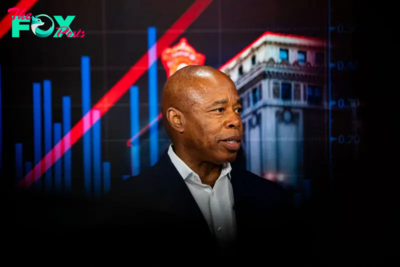Politics
Exclusive: Ro Khanna’s Bold Proposal to Cap Childcare at $10 a Day for Most Families
As parents across the U.S. juggle work commitments and soaring childcare costs, a California Democrat wants Congress to offer a lifeline to struggling families, and sees a way in which it might actually happen.
On Friday, Rep. Ro Khanna plans to introduce a bill that would cap the cost of childcare at just $10 a day for every family earning under $250,000 annually. If it succeeds, the proposal could establish the U.S. equivalent of Canada’s landmark childcare initiative, known for significantly lowering costs and improving access.
Khanna’s proposal, shared exclusively with TIME ahead of its release, comes as childcare affordability has emerged as a top election issue. Khanna acknowledged that his bill stands little chance of passing outside of one scenario: Vice President Kamala Harris defeating Donald Trump, and Democrats winning control of the House and keeping control of the Senate. If such a scenario were to materialize, he predicted the initiative would gain significant momentum.
“I think Harris would back the concept,” he says in an interview in his Capitol Hill office, adding that he pitched the idea to her campaign advisors, who assured him that childcare will be a main priority of her campaign. “I think it's a strong issue for her to highlight—how her vision is going to reduce costs for Americans.” Harris has proposed a $6,000 child tax credit in the first year of a child's life, a plan that Khanna supports but describes as “not enough.”
Advocates argue that Khanna's bill could rein in what has become an overwhelming financial burden for millions of American families. According to Child Care Aware of America, the average cost of daycare exceeds $10,000 annually for a single child, with some states reporting expenses exceeding $20,000—often more than the cost of in-state college tuition. For many families, this financial burden serves as a barrier to career advancement and economic stability. (Khanna’s office originally told TIME the bill’s income threshold would be $400,000, but later revised it to $250,000.)
“As a father of young kids, I understand how difficult this is for families,” Khanna says. “Particularly for those who are away from grandparents or uncles or aunts and are working or middle class. But I also think that it is fundamental to giving people a fair shot at the American dream—that the biggest investment we can make is in young children to have a big economic return.”
Khanna’s plan comes with a hefty price tag—approximately $100 billion annually, which is more than double what the U.S. currently spends on childcare programs and about an eighth of the federal budget allocated for national defense. Critics are sure to target the cost, as the bill does not explicitly outline its financial sources. Khanna, who calls himself a progressive capitalist and represents the wealthiest district in Congress (Silicon Valley), suggests several potential funding mechanisms, including raising the corporate tax rate to 28%, increasing inheritance taxes, and creating a financial transaction tax.
“The cost is about $100 billion a year, so it’s a significant cost,” Khanna explains. “But this is what universal childcare in America would look like. It is the Medicare for All version for childcare.”
Almost 70,000 Americans reported missing work last month due to childcare problems, according to the Labor Department. Working mothers, in particular, face the brunt of this burden, with data indicating they were nearly three times as likely as fathers to take time off for childcare last year. “This is a crisis in our community,” says Erin Erenberg, CEO of Chamber of Mothers. “I hear from too many mothers who are not able to afford childcare and don’t have paid leave… If we are truly pro-life and pro-family, we have to put our money where our mouth is and invest in family Health and security.”
For Octaviano Mares, a high school chemistry teacher in the Los Angeles area with three children, finding a high-quality and affordable daycare center while he and his wife work full time jobs has been a constant struggle. "When you're a first-generation family, you don't have some of the luxuries that affluent parents have,” he says. “We were surviving day to day, trying to save up for a house, paying off our student loans—and daycare took quite a bit of money away. It's kind of like a requirement.”
At the heart of Khanna’s proposal is a grant program, which allocates approximately $780 billion over ten years to fund childcare providers. States will receive funds to contract directly with providers, covering a significant portion of their operational costs.
Asked about potential criticism that daycare centers might be less profitable under a $10-a-day system, Khanna said, “They’re getting federal payments to offset that cost. Now they have to show that they are not increasing their fees more than the rate of iNFLation to qualify for the grants… providers must commit to keeping fees at a reasonable rate.”
The childcare sector is currently grappling with a significant shortage of workers, exacerbated by low wages that often leave caregivers earning salaries comparable to those in fast-food jobs, he says. Khanna’s bill would establish a nationwide wage floor of $24 per hour for childcare workers, an attempt to attract and retain the workforce necessary to meet the growing demand for quality childcare.
Harris has framed her economic goals as creating an “opportunity economy,” proposing a permanent increase in the child tax credit, adding a one-time $6,000 credit for newborns, and capping childcare costs at 7% of a family’s income. In contrast, former President Donald Trump has acknowledged the importance of childcare but shifted focus to economic strategies, suggesting that expanding the child tax credit could be a potential solution. His running mate, J.D. Vance, has advocated for a more traditional approach, emphasizing the benefits of a stay-at-home parent and encouraging families to rely on relatives to manage costs.
Most other developed countries, such as Canada, Finland, and Sweden, have addressed the high costs of childcare in one way or another. But the U.S. has yet to catch up, following years of underinvestment in childcare, exacerbated by the end of pandemic-era support. The Biden Administration hoped it would be able to pass $225 billion in funding to fully cover childcare for low-income Americans and an additional $200 billion for universal preschool, but those proposals failed to win support in Congress. The chair of Biden’s Council of Economic Advisers, Jared Bernstein, said this summer that he considers the high cost of childcare an area of “unfinished Business” and blamed Congress for not addressing the problem.
In Canada, parents now pay an average of $10 a day for care, leading to increased financial stability for families and childcare providers alike, according to advocates.
While Khanna draws inspiration from Canada’s childcare system, he also emphasizes the need for flexibility in the U.S. model. “Here, we’re providing choice, so we’re keeping the private sector very much involved,” he explains. “In Canada, it’s more public. Here 90% of it is private.”
For families who choose to care for their children at home, Khanna said his bill would provide a monthly stipend of $300 per child under the age of three for eligible families opting out of external childcare services. Additionally, relatives who provide care would be able to receive compensation for their support.
Khanna’s proposal has already drawn the support of various childcare advocacy groups, including Chamber of Mothers and Moms First. But it’s sure to draw skepticism in Congress, particularly among Republicans who are likely to argue that the price tag is unreasonable and question the funding sources. Nevertheless, Khanna is hopeful that the bill can serve as a “North Star” for the childcare debate in Congress, shifting perceptions and expectations about what is possible.
“What I’m hoping this bill shows is that to really take it seriously in the House, to show what the broadest aspiration would look like, so that other bills are actually seen as the pragmatic compromise,” Khanna says.
Whether or not his bill gains traction in a polarized Congress remains to be seen. But advocates like Reshma Saujani, the founder of Girls Who Code and Moms First who recently created a viral moment when Trump gave a nonsensical answer to her question about his childcare policy plan, say the momentum is undeniable.
“Something has shifted,” she says. “Childcare finally has been vaulted into the national conversation. When voters say that they can’t get to work because gas prices are too high, politicians take them seriously and do something about it. When parents say that they can’t get to work because daycare is too expensive, they deserve the same treatment and consideration.”
-

 Politics7h ago
Politics7h agoWho is Tim Walz? Understanding the Minnesota Democratic-Farmer-Labor Party can help make sense of the VP candidate
-

 Politics7h ago
Politics7h agoPost-election violence is possible in US, political scientist says − and it could be worse than Jan. 6
-

 Politics23h ago
Politics23h agoLocal government controls your roads, schools and utilities − but that doesn’t mean the US president doesn’t touch your life in important ways
-

 Politics23h ago
Politics23h agoWhat is ‘dark money’ political spending, and how does it affect US politics?
-

 Politics1d ago
Politics1d agoLebanese civilians are fleeing the south, fearing an Israeli invasion − a look back at 1982 suggests they have every reason to worry
-

 Politics1d ago
Politics1d agoWhy do people still back Trump, after everything? 5 things to understand about MAGA supporters’ thinking
-

 Politics1d ago
Politics1d agoA brief history of former presidents running for reelection: 3 losses, 1 win and 1 still TBD
-

 Politics1d ago
Politics1d agoNo, immigrants aren’t eating dogs and cats – but Trump’s claim is part of an ugly history of myths about immigrant foodways



























